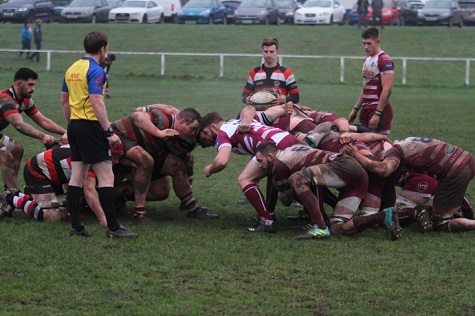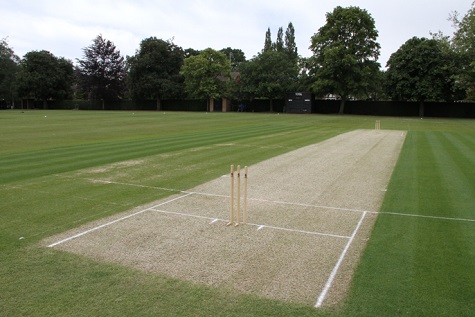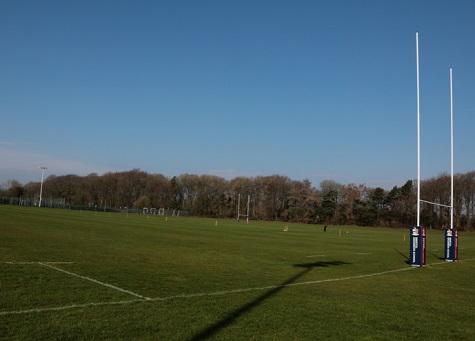I visited Stratford-Upon-Avon recently and found myself going on one of those large Ferris wheels, with the aim to get a bird’s eye view of Shakespeare’s birthplace town. The views were spectacular and I was extremely pleased to enjoy an overhead view of Stratford Cricket Club, who were hosting a Saturday afternoon league game.

A view from above affords a sense of the scale of work involved in preparing and maintaining a cricket ground. More importantly though, seeing it being used makes it all worthwhile.
We often forget the value of community sport and what it brings to the table. How can you put a value on what these facilities achieve in terms of bringing together and supporting local communities? Natural turf grassroots sports clubs - and within these I’m including rugby, football, cricket and bowls - all provide a vital access to competitive sport.
Community sports clubs bring numerous values to the table, positively impacting individuals, communities, and society as a whole. Here are some key values associated with community sports clubs:
Physical health and well-being: Sports clubs promote physical activity, encouraging people to engage in regular exercise and leading to improved fitness levels and overall health. Regular participation in sports can help prevent chronic diseases, enhance cardiovascular health, strengthen muscles and bones, and contribute to weight management.
Mental health and emotional well-being: Sports clubs provide opportunities for individuals to engage in physical activity, which has proven benefits for mental health and well-being. Participation in sports can reduce stress, alleviate symptoms of anxiety and depression, boost self-esteem, and improve mood by releasing endorphins. Additionally, being part of a sports community fosters social connections, support networks, and a sense of belonging, which are crucial for mental well-being.
Skill development and personal growth: Community sports clubs offer a platform for individuals to develop and enhance their athletic skills. Participants can learn new sports, improve existing skills, and acquire valuable teamwork, communication, leadership, and problem-solving abilities. Through the challenges and successes experienced in sports, individuals develop resilience, discipline, perseverance, and goal-setting skills that can be applied in various aspects of life.
Social integration and inclusion: Community sports clubs bring people from diverse backgrounds together, fostering social integration and inclusion. They provide opportunities for individuals of different ages, genders, ethnicities, and abilities to participate and collaborate, breaking down barriers and promoting understanding, tolerance, and respect. Sports clubs often create a sense of community pride and identity, strengthening social cohesion.
Education and lifelong learning: Sports clubs often prioritise the development of young athletes and provide educational opportunities. Coaches and mentors impart knowledge and skills related to specific sports techniques, tactics, and strategies. Furthermore, sports clubs may emphasise the importance of education, offering academic support, scholarships, or mentorship programs that encourage athletes to balance their studies and sports commitments.

Volunteerism and community engagement: Community sports clubs rely on volunteers who contribute their time, expertise, and passion. By engaging in volunteer work, individuals develop a sense of civic responsibility, leadership, and empathy. Sports clubs often organise community events, tournaments, or charity initiatives that bring the community together, creating a positive impact beyond the boundaries of the club itself.
Healthy lifestyle promotion: Community sports clubs advocate for healthy lifestyles beyond the sports field. They raise awareness about nutrition, hydration, injury prevention, and the dangers of substance abuse. Sports clubs serve as role models and inspire individuals to adopt healthy habits, leading to better overall well-being.
And for a chosen few, they can provide a career pathway into becoming a professional sportsperson.
These values collectively contribute to the personal development, social fabric, and overall health of individuals and communities, making community sports clubs an integral part of society.

The work of the people looking after and maintaining these grounds must not be overlooked. We should ensure they continue to get the resources, support and funding required to improve and sustain these wonderful theatres of sport.
We are now lucky to have via the Grounds Management Association a new grounds management framework set up to support clubs in their efforts to maintain their playing surfaces.
This, along with the GMA Pitch Advisory Service, go a long way to helping community sports clubs thrive. Potential funding is also available for clubs to improve their facilities or buy much needed new machinery and equipment.

As a Pitch Advisor for the RFU myself, there never been a better time for clubs to improve their playing surfaces. Rugby Grounds Connected (RGC) for example, is an easy access, two-way communication network between the RFU and rugby union grounds people. It is the main communication channel for the RFU to provide information and advice to grounds people and has special offers and exclusive benefits for members. Everything the RFU does with relation to pitch maintenance comes under the banner of Rugby Grounds Connected.
There is also a series of events being held at several clubs up and down the country Honda Rugby Grounds Connected - Regional Events 23 | Eventbrite I will be attending the one at Stafford RFC on the 14th June starting at 9am.
I look forward to seeing any midlands clubs who may be attending.